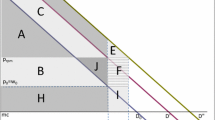Abstract
Mainstream economists do not address the question of the duty of the firm in selling to the poor. To them the issue is normative, and they have taken pains to delimit economics as a positive discipline. They separate value and fact, and engage themselves in questions relating to what is and not what should be. Forensic economists hold a different view. Firms are liable for damages due not just to deception and fraud but to negligence as well, and governments have consumer protection agencies to examine cases involving the duty of the firm well beyond deception and fraud. Social economists reject the argument based on libertarianism and individualism that the firm has only one purpose: increasing shareholder value. Social economists view the firm as having several constituencies — shareholders, managers, workers, customers, suppliers, neighbors, partners — and duties associated with each one. Those duties are grounded in the virtue of justice: to render to another that which is owed. The firm has a duty to its customers, its suppliers, and its employees deriving from the principle of equivalence; to its shareholders and employees from the principle of distributive justice; to its competitors and neighbors from the principle of contributive justice. This article argues that the firm has a special duty in selling to the poor which is grounded in the person of the one who is poor, the three principles of economic justice, and the principle of subsidiarity. Mainstream economists address poverty apart from consumer behavior as if the two were unrelated. This article brings the two together and in so doing helps throw light on the question of the duty of the firm in selling to the poor.
Similar content being viewed by others
References
Davis, John B. and Edward J. O’Boyle, eds. (1994).The Social Economics of Human Material Need. Carbondale, IL: Southern Illinois University Press.
Friedman, Milton. (1962).Capitalism and Freedom. Chicago: The University of Chicago Press.
O’Boyle, Edward J. (1993). “On Need, Wants, Resources and Limits.”International Journal of Social Economics, 20, 12: 13–26.
O’Boyle, Edward J. (Fall 1994) “Homo Socio-Economicus: Foundational to Social Economics and the Social Economy.”Review of Social Economy, 286–313.
U.S. Bureau of the Census. (1996).Statistical Abstract of the United States: 1996 (116th edition). Washington, DC: U.S. Government Printing Office.
Author information
Authors and Affiliations
Additional information
An earlier version was presented as a paper at the midwest Economics Association annual meetings in Kansas City in March 1997.
Rights and permissions
About this article
Cite this article
O’Boyle, E.J. The duty of the firm in selling to the poor: A question of the person, justice, and subsidiarity. FSSE 28, 7–21 (1998). https://doi.org/10.1007/BF02746413
Issue Date:
DOI: https://doi.org/10.1007/BF02746413




